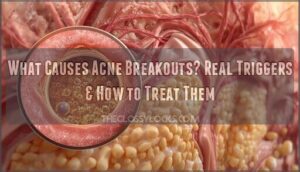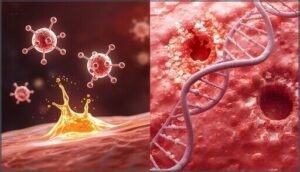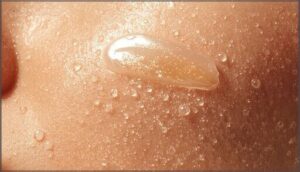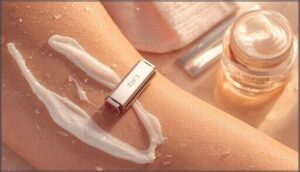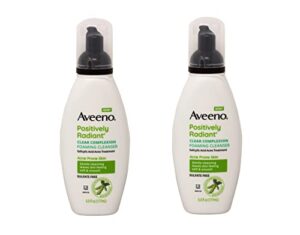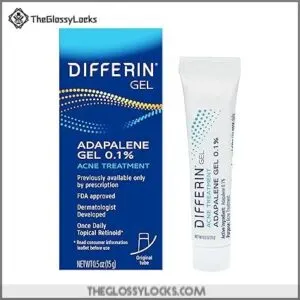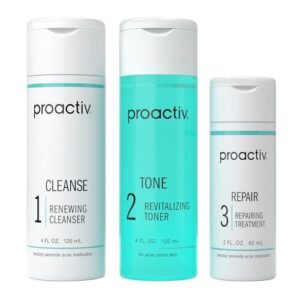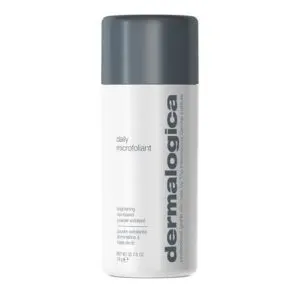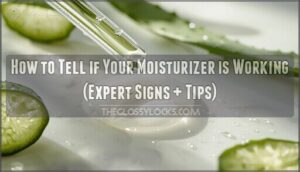This site is supported by our readers. We may earn a commission, at no cost to you, if you purchase through links.
Your skin doesn’t break out randomly. Each pimple, cyst, or whitehead follows a predictable biological chain reaction that starts deep inside your pores. Dead skin cells clump together with oil, creating a plug. Bacteria multiply in this oxygen-starved environment. Your immune system sends inflammatory signals, and the result shows up on your face.
But here’s what most people miss: what causes acne breakouts isn’t just about dirty skin or bad luck. Hormones spike your oil production. Your genes determine how your skin reacts to inflammation. Even your pillow, sunscreen, and stress levels play documented roles in triggering new lesions.
Understanding these mechanisms gives you real control over your skin.
Table Of Contents
- Key Takeaways
- Why Do Acne Breakouts Happen?
- How Hormones and Genetics Cause Acne
- Lifestyle Factors Triggering Acne
- Diet and Environmental Acne Causes
- Skincare and Haircare Product Triggers
- Top 4 Products for Acne-Prone Skin
- Frequently Asked Questions (FAQs)
- What causes acne breakouts?
- What are the ways to avoid skin breakouts?
- Where do acne breakouts occur?
- Why do I have breakouts on my face?
- Can hormonal acne cause breakouts?
- What causes pimples & acne?
- What is the main cause of acne breakouts?
- How do I stop acne breakouts?
- What is the reason for acne pimples?
- Which foods cause acne?
- Conclusion
Key Takeaways
- Acne forms when dead skin cells and oil create a plug inside your pores, trapping bacteria and triggering inflammation that shows up as redness, swelling, and breakouts.
- Hormones like testosterone spike oil production while your genes determine how aggressively your skin reacts to inflammation, making some people more prone to severe acne regardless of hygiene habits.
- Lifestyle factors including stress-induced cortisol, poor sleep, friction from clothing or helmets, and high-glycemic foods directly fuel oil overproduction and weaken your skin’s barrier defenses.
- Target acne at its source using salicylic acid to unclog pores, retinoids like adapalene to normalize cell turnover, and benzoyl peroxide to kill bacteria while avoiding comedogenic products that trap oil in follicles.
Why Do Acne Breakouts Happen?
Acne doesn’t just appear out of nowhere. Your skin goes through a specific chain of events that leads to those frustrating breakouts.
Understanding how this process unfolds can help you target it more effectively with a daily skin cleansing routine for acne that actually works.
Here’s what’s actually happening beneath the surface when a pimple forms.
How Pores Become Clogged
Pore blockage starts when dead skin cells stick to oil lining your follicles. This creates a plug that blocks airflow and traps bacteria inside.
The buildup forms a whitehead under the skin or a blackhead when exposed to air. Makeup residue, pollution, and debris worsen skin congestion by piling onto the plug, making clogged pores tougher to clear with washing alone.
Factors like oil production and noncomedogenic product selection also play a key role in preventing pore blockages.
Role of Oil (Sebum) Production
Your sebaceous glands pump out sebum, a lipid-rich cocktail that keeps your skin lubricated and protected. But when androgens like testosterone ramp up production, excess oil floods your pores and clogs them fast.
Here’s how sebum regulation breaks down:
- Hormonal spikes trigger oil overproduction
- Thick sebum blocks follicle openings
- Dead cells mix with oil, forming comedones
That’s why oil balance matters for preventing breakouts. Recent research highlights the importance of sebum composition and function in maintaining healthy skin barriers.
Inflammatory Responses in The Skin
Once oil and debris clog your follicles, your immune cells jump into action. They release cytokines like IL-1 and TNF-alpha that intensify inflammation pathways throughout the dermis. This cascade triggers vascular changes—redness, swelling, and warmth—as neutrophils flood the area to clear debris. Understanding these inflammation mechanisms helps you choose acne treatments that target the root inflammatory response, not just surface symptoms.
Your immune system fights clogged pores with inflammatory cytokines that cause the redness, swelling, and warmth you see in acne
| Inflammatory Trigger | Immune Response | Visible Effect |
|---|---|---|
| Clogged follicle | Cytokine release | Redness and heat |
| Barrier disruption | Immune cell recruitment | Swelling and pain |
| Sustained inflammation | Vascular permeability | Persistent breakouts |
Bacterial Overgrowth and Acne
Bacteria living in your follicles don’t just multiply—they organize into protective Bacterial Biofilms that shield them from treatments and your immune system. C. acnes Phylotypes thrive in oil-rich pores, releasing enzymes that worsen pore clogging and inflammation. Microbiome Imbalance, not simple overgrowth, drives persistent acne by favoring inflammatory strains over beneficial bacteria.
- Biofilms inside follicles protect bacteria from antibiotics and prolong breakouts
- Specific C. acnes Phylotypes correlate with severe inflammation and nodular acne
- Bacterial enzymes break down oil into irritating fatty acids that intensify clogging
- Reduced microbial diversity on acne-prone skin amplifies inflammatory signaling
- Targeting biofilm disruption alongside bacteria improves long-term acne control
How Hormones and Genetics Cause Acne
Your body’s internal chemistry plays a bigger role in acne than most people realize. Hormones don’t just affect your mood—they directly control how much oil your skin produces and how easily your pores get clogged.
That’s why targeted acne treatment methods often work best when they address both surface symptoms and underlying hormonal triggers.
But it’s not just about hormones; your genes can set you up for breakouts before you even hit puberty.
Hormonal Fluctuations and Breakouts
Your skin reacts swiftly when hormones shift. Hormone fluctuations change oil production and pore behavior, creating the perfect storm for hormonal acne. Menstrual acne flares about a week before your period as progesterone rises and estrogen drops. Pregnancy acne strikes when human chorionic gonadotropin surges.
Here’s how different phases affect your skin:
| Life Stage | Hormonal Change | Acne Pattern |
|---|---|---|
| Premenstrual | Estrogen levels fall, androgens relatively higher | Jawline and chin breakouts worsen |
| Menopause | Declining estrogen, persistent androgen effects | Oiliness despite drier skin elsewhere |
| Pregnancy | Elevated hormones, inflammatory shifts | Second trimester flares common |
| Postpartum | Rapid hormone fluctuations | New breakout waves |
| Cycle Stabilization | Hormone balance restores | Skin heals, inflammation reduces |
Understanding hormonal imbalance helps target acne causes and prevention effectively.
Testosterone, Estrogen, and Adult Acne
Your adult acne won’t budge when androgen levels outpace estrogen. Testosterone drives sebum production higher, filling pores with excess oil that traps dead cells and bacteria. Even normal hormones cause breakouts if your androgen-to-estrogen ratio tips wrong.
Acne treatment targeting this hormonal imbalance works—estrogen therapy or antiandrogen approaches restore hormone balance. Jawline clusters signal hormone fluctuations at work, demanding strategies beyond surface fixes for lasting acne causes and prevention.
Genetic Predisposition to Acne
Your family tree holds clues to your breakouts. Twin studies show heritability factors reach 85 percent for acne, meaning genetic predisposition determines much of your risk.
Genetic variants like IL6 rs1800796 and TNF rs1800629 increase severity and occurrence across populations. These gene expressions alter sebum composition, skin barrier function, and inflammatory responses.
Acne inheritance explains why causes of acne cluster in families—genetics and acne share deep biological roots you can’t scrub away.
Lifestyle Factors Triggering Acne
Your daily habits can sabotage your skin without you realizing it. Stress, sleep deprivation, and even the way you touch your face all trigger inflammation and oil production.
Here’s how these lifestyle factors fuel breakouts and what you can do to break the cycle.
Stress and Cortisol’s Impact on Skin
Stress doesn’t just mess with your mood—it triggers cortisol, a hormone that cranks up oil production and fuels inflammation. When cortisol floods your system, your sebaceous glands pump out excess sebum that clogs pores and creates the perfect storm for breakouts.
Worse, elevated cortisol weakens your skin barrier and slows healing, making blemishes stick around longer.
Managing stress through meditation or exercise helps restore hormone balance and aids acne prevention.
Poor Sleep and Acne Flare-Ups
When you skimp on sleep, your body floods with cortisol and disrupts hormone regulation that controls oil production and skin renewal. Poor sleep patterns increase inflammatory markers, weaken your skin barrier, and allow acne triggers to multiply.
Nighttime routines matter—ditching quality sleep means compromising your skin health while acne-causing bacteria thrive.
Prioritize consistent rest to restore balance, support skincare effectiveness, and quiet those stubborn flare-ups.
Physical Friction and Sweat
Tight headbands and sweaty workout gear trap heat and create friction that irritates your skin, leading to breakouts. When sweat mixes with oil and dead cells, you’re setting up perfect conditions for clogged pores.
Friction causes redness and microabrasions, while moisture control becomes critical.
Choose breathable fabrics for friction reduction, avoid restrictive clothing during exercise, and shower promptly to minimize skin irritation and prevent acne flare-ups.
Skin Picking and Its Effects
Picking at your breakouts sets off a vicious cycle. When you touch inflamed acne, you introduce bacteria and create open wounds that become infected or scarred.
Skin Picking Disorder can develop from stress and emotional distress, where the urge to pick worsens anxiety. Physical consequences include deeper inflammation and tissue damage.
Focus on coping strategies like behavioral therapy and proper skincare to break the pattern.
Diet and Environmental Acne Causes
What you eat and where you spend your time can trigger breakouts just as much as your skincare routine. Certain foods spike your insulin and fuel inflammation, while environmental factors like pollution and travel throw your skin off balance.
Here’s what you need to know about the dietary and environmental triggers that could be causing your acne.
Dairy, Sugar, and High-Glycemic Foods
Your diet can directly fuel breakouts through inflammation and hormones. High glycemic foods spike blood sugar, triggering insulin surges that ramp up oil production and worsen acne. Dairy effects include raising growth factors that activate acne-related hormones in your skin.
- Sugar intake from processed foods drives inflammation and sebum overproduction
- Dairy products like milk increase insulin-like growth factor levels in your body
- Nutrition planning with whole foods instead of refined grains helps control breakouts
Hydration and Skin Health
Water intake does more than quench thirst—it fortifies your skin’s defenses against breakouts. Hydration benefits include stronger barrier function that blocks irritants and reduces inflammation.
Proper moisture balance maintains skin elasticity, helping your complexion bounce back from stress and environmental damage. Dehydration thickens sebum, making clogged pores more likely.
Drinking enough water paired with quality skincare keeps skin health on track.
Air Pollution and Skin Irritation
Air pollution isn’t just bad for your lungs—it wages war on your skin barrier. Particulate matter and air toxins trigger inflammation and clogged pores, especially with urban exposure. PM2.5 particles penetrate deep, causing oxidative stress that fuels skin conditions like acne. Ozone and nitrogen dioxide disrupt lipids, weakening your defenses.
Your skincare routine needs to fight back against these pollution effects.
Traveling and Humidity Changes
When you travel, humidity swings can trigger a breakout within 24 hours. Aircraft cabins hover at 10 to 20 percent humidity, drying your skin barrier. Hotels in tropical zones can hit 70 percent overnight, flooding pores with sweat and oil. Your skin can’t keep up with the hormones and stress already at play.
- Carry a lightweight, noncomedogenic moisturizer for climate adaptation
- Switch to a gentle cleanser in dry air to preserve skin hydration
- Use humidity control strategies like portable sprays for travel skincare and acne prevention
Skincare and Haircare Product Triggers
The products you put on your skin and hair can work against you. Certain sunscreens create a film that traps oil and dead cells in your pores.
Even your shaving routine might be triggering breakouts you didn’t expect.
Sunscreens and Breakouts
Your sunscreen could be sabotaging your skin. Some formulas trap oil and sweat in pores, triggering breakouts when you’re trying to protect yourself.
The fix starts with choosing mineral sunscreens that use physical blocks like zinc oxide or titanium dioxide. These reflect UV rays without clogging follicles. Look for oil-free formulas labeled non-comedogenic and fragrance-free to minimize irritation. Lightweight gel textures work best for acne-prone skin.
Reapply every two hours after sweating, but blot excess oil first. At night, cleanse thoroughly to remove residue. Your skincare routine needs sun protection that won’t betray you.
Shaving, Hair Removal, and Follicle Irritation
Dragging a razor across your face or body doesn’t just trim hair—it can spark follicle inflammation that triggers breakouts. Ingrown hairs curl back into skin, creating red bumps and pores packed with bacteria. Razor burn appears within hours as stinging patches where you’ve irritated follicles.
Your shaving techniques matter. Use a warm cloth first to soften hair, then apply fragrance-free cream for protection. Shave with the grain, not against it, to minimize cuts. Dull blades increase friction and micro-abrasions.
After hair removal, skip alcohol-based products and tight clothing. Apply a gentle moisturizer to restore your skin barrier and prevent inflammation from spiraling into acne.
Top 4 Products for Acne-Prone Skin
You don’t need to gamble on which products actually work. The right ingredients can unclog pores, reduce inflammation, and stop bacteria in their tracks.
Here are four dermatologist-backed options that target the root causes of acne.
1. Aveeno Clear Complexion Foaming Cleanser
Your skin deserves a cleanser that fights acne without stripping it bare. Aveeno Clear Complexion Foaming Cleanser uses salicylic acid to unclog pores by dissolving dead skin cells and excess oil. Soy extract helps even out your skin tone while keeping things hydrated.
The formula is oil-free, non-comedogenic, and gentle enough for daily use. It targets blackheads and whiteheads without overdrying, especially in your T-zone. You’ll get a lightweight foam that rinses clean, leaving your skin soft and ready for the rest of your routine.
| Best For | People with acne-prone or combination skin who want to clear breakouts and even out skin tone without harsh drying. |
|---|---|
| Skin Type | Breakout-prone, Adult |
| Form | Liquid wash |
| Fragrance | Scented (Salt) |
| Primary Benefit | Prevents breakouts |
| Daily Use | Yes |
| Non-comedogenic | Yes |
| Additional Features |
|
- Salicylic acid unclogs pores while soy extract fades discoloration and evens skin tone
- Oil-free, non-comedogenic formula cleanses without stripping or overdrying
- Gentle enough for daily use and leaves skin soft and hydrated
- Contains fragrance that might irritate sensitive skin
- Pump mechanism can malfunction or get stuck
- May still be too drying for very dry or sensitive skin types
2. Differin Acne Treatment Gel
Differin Gel packs adapalene at 0.1 percent, an FDA-approved retinoid that works deep in your follicles. It normalizes how skin cells turn over, so dead cells don’t pile up and clog your pores.
This prevents new breakouts and clears existing ones over 8 to 12 weeks. You’ll apply a pea-sized amount once daily on clean skin.
Expect dryness or mild peeling at first—that’s the retinoid doing its job. Pair it with sunscreen during the day since it increases sun sensitivity.
| Best For | People dealing with stubborn acne who want a dermatologist-recommended retinoid that tackles breakouts at the source and prevents new ones from forming. |
|---|---|
| Skin Type | Acne-prone, Sensitive |
| Form | Gel |
| Fragrance | Unscented |
| Primary Benefit | Clears and prevents acne |
| Daily Use | Yes |
| Non-comedogenic | Yes |
| Additional Features |
|
- Works deep in pores to stop acne before it starts, not just treating what’s already there
- FDA-approved retinoid strength without needing a prescription
- Gentle formula that’s fragrance-free and won’t clog pores, even for sensitive skin
- Takes up to 12 weeks to see full results, so you need patience
- Causes dryness and peeling during the first few weeks as your skin adjusts
- Makes your skin more sensitive to sun, so daily sunscreen is a must
3. Proactiv Acne Treatment Kit
Proactiv’s three-step kit combines benzoyl peroxide cleanser, glycolic acid toner, and a repairing treatment to fight breakouts from multiple angles. The cleanser uses micronized benzoyl peroxide to penetrate pores and kill bacteria. The toner exfoliates dead cells without harsh alcohol. You’ll use the 2.5 percent benzoyl peroxide treatment on active spots or your whole face.
Expect results within several weeks with twice-daily use. It’s marketed as a 60- to 90-day supply, so you’ll need to commit to the routine and potentially manage some initial dryness.
| Best For | People with mild to moderate acne who want a complete system and are willing to stick with a consistent routine for at least a few weeks. |
|---|---|
| Skin Type | All ages, Sensitive |
| Form | Cream system |
| Fragrance | Unscented |
| Primary Benefit | Reduces acne |
| Daily Use | Yes |
| Non-comedogenic | Not specified |
| Additional Features |
|
- Three-step system targets acne from multiple angles with benzoyl peroxide and glycolic acid
- Works for different ages and skin types, including sensitive skin
- Provides a 60-day supply so you’re not constantly reordering
- Can cause dryness, irritation, or flaking when you first start using it
- Requires patience and consistent twice-daily use to see results
- More expensive than many drugstore acne products
4. Dermalogica Daily Face Exfoliator Powder
Dermalogica’s rice-based powder activates with water to form a gentle paste that physically exfoliates without harsh scrubbing. The formula includes papaya enzyme and salicylic acid to dissolve dead cells and unclog pores.
You’ll massage a half-teaspoon portion onto damp skin for one minute after cleansing. This approach prevents surface buildup that leads to breakouts while supporting smoother texture for better product absorption.
It’s marketed for daily use on most skin types, including acne-prone skin, though you may need patience during an initial purging phase.
| Best For | People with dull or uneven skin tone who want a gentle daily exfoliator that won’t irritate sensitive skin but still tackles blackheads and texture issues. |
|---|---|
| Skin Type | Most types, Sensitive |
| Form | Powder |
| Fragrance | Unscented |
| Primary Benefit | Removes debris, evens tone |
| Daily Use | Yes |
| Non-comedogenic | Not specified |
| Additional Features |
|
- Rice-based powder formula is gentle enough for daily use while still being effective at smoothing skin and clearing pores
- Papaya enzyme and salicylic acid work together to dissolve dead skin cells without harsh physical scrubbing
- Versatile powder format lets you control the consistency and prevents contamination of the product
- Higher price point compared to most drugstore facial scrubs
- Small 2.61-ounce container may run out quickly if you use it every day
- May cause an initial purging period due to salicylic acid, so you’ll need to stick with it to see real results
Frequently Asked Questions (FAQs)
What causes acne breakouts?
Your pores clog when oil and dead skin cells mix together inside hair follicles. Bacteria multiply in those blocked spaces, triggering inflammation that shows up as redness, swelling, and breakouts.
What are the ways to avoid skin breakouts?
You’ll dodge breakouts by washing twice daily with sulfate-free cleansers, choosing non-comedogenic products, and protecting your skin with oil-free SPF 30 sunscreen.
Skip picking blemishes, keep hands off your face, and stay hydrated.
Where do acne breakouts occur?
Breakouts show up wherever oil glands cluster most. You’ll see them on your forehead, nose, chin, cheeks, jawline, upper back, shoulders, chest, and even your hairline.
Why do I have breakouts on my face?
Your clear complexion can betray you overnight—breakouts happen when hair follicles clog with oil and dead skin cells, triggering inflammation.
Hormones, stress, diet, and friction from hats or phones often worsen this process.
Can hormonal acne cause breakouts?
Yes. Hormonal shifts trigger your oil glands to overproduce sebum, which clogs pores and fuels inflammation. Androgens spike before menstruation, during puberty, and with conditions like PCOS, making breakouts worse.
What causes pimples & acne?
Over 80% of people experience acne at some point. Pimples form when your pores trap oil and dead skin cells, creating a plug that bacteria invade, triggering inflammation and breakouts.
What is the main cause of acne breakouts?
The main driver is clogged hair follicles. Oil from your sebaceous glands mixes with dead skin cells, trapping bacteria inside. This blockage sparks inflammation, turning microscopic debris into visible breakouts.
How do I stop acne breakouts?
Stop breakouts by using noncomedogenic products, cleansing gently twice daily, and avoiding skin picking. Manage stress, get quality sleep, and limit high-glycemic foods. Consult a dermatologist for tailored treatment plans.
What is the reason for acne pimples?
Pimples form when dead skin cells and oil combine into a plug that blocks your pore. Bacteria multiply in this trapped environment, triggering inflammation that creates the redness and swelling you see.
Which foods cause acne?
High glycemic foods like white bread and sugary drinks spike your insulin within minutes, fueling extra oil production that clogs pores.
Dairy and fried foods also trigger breakouts in many people.
Conclusion
Think of your skin as a battlefield where triggers fight for control. What causes acne breakouts isn’t one villain—it’s hormones, bacteria, friction, diet, and products forming an alliance against you.
But you’ve got science-backed weapons now. Salicylic acid dissolves clogs. Retinoids reset cell turnover. Gentle cleansers stop oil without stripping defenses.
You’re no longer guessing. You’re targeting the real enemies beneath your skin, one informed choice at a time.

